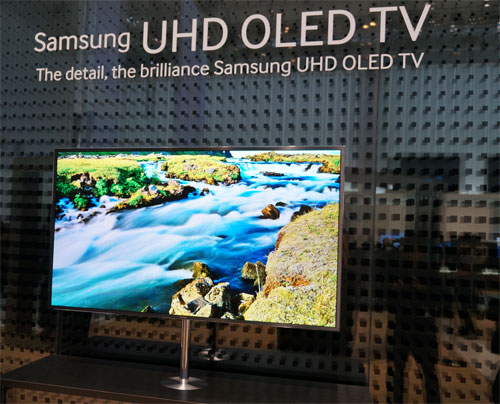Samsung’s OLED TV programme may not be dead and buried just yet, thanks to a number of technological advancements that could help solve its crippling production problems. These advancements include the development of a new AMOLED display architecture, a new colour-tunable W-OLED lighting panel, plus methods to make single-layer encapsulation technology more efficient.

The developments were announced by Universal Display, which happens to be a key partner of Samsung, at the recent 2014 Society for Information Display (SID) Conference. Of crucial importance for Samsung is that the new AMOLED display architecture directly addresses one of the biggest problems plaguing its OLED television efforts – unprofitably low manufacturing yields.
The new architecture was announced by Universal Display’s Dr. Mike Hack in a paper called “Novel Two-Mask AMOLED Display Architecture” which detailed a method that should make it possible to extend an OLED display’s lifespan by up to eight times. Specifically, the architecture should also make OLED displays a lot easier to manufacture, particularly in the case of larger TVs, while other benefits include reduced power consumption and increased display resolution such as 4K Ultra HD. That’s because it allows for OLED displays to be built using just two low-resolution masking steps, which results in “improved lifetime compared to an equivalent RGB side-by-side AMOLED display using three high-resolution patterning steps.”
Samsung has been left behind in the OLED TV race by its arch-rival LG Electronics because it uses an entirely different technology. LG’s relatively simple white-OLED tech has proven to be far easier to manufacture, and as a result it’s slashed the costs of its OLED TVs to a price point that Samsung just cannot compete with. Currently, LG’s 55-inch curved OLED television is on sale for just £4000, compared to Samsung’s 55in “true RGB” OLED model which is priced at £7000.
Samsung couldn’t afford to keep pace with LG’s price cuts, but assuming the former takes note of Universal Display’s new techniques, that could change. Indeed, we could soon see the company reverse a decision it took last month to shelve building plans for a new large screen OLED television manufacturing facility.
If and when that happens – and it remains to be seen if it will – that could open the floodgates to a wave of more affordable OLED TVs priced within the reach of the average consumer.
Source: The Motley Fool